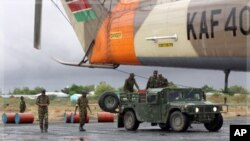As Kenyan fighters push into Somalia in pursuit of al-Shabab militants, speculation is rising about which foreign forces may be backing the operation. No nations have admitted involvement, but local and international media reports suggest the army isn't going it alone.
Kenyan military spokesman Emmanuel Chirchir was quoted as saying there are "certainly other actors in this theater," and an official Army statement said French naval ships took part in shelling the key al-Shabab stronghold of Kismayo, a claim Nairobi officials backed away from after French diplomats refuted the allegation and asked local newspapers to issue corrections.
The United States has had close relations with Kenya's military and provided logistical support and training to its armed forces in the past. Asked if the U.S. is providing support for the Kenyan military operation, Assistant Secretary of State for African Affairs Johnnie Carson says the U.S. hasn't "provided Kenya with any cross-border assistance."
"We were not privy to their decision to go across the border," he said in a recent interview. "It is their decision and not something that we were consulted about."
But former Kenyan Army Major Imaana Laibuta isn't so easily convinced.
"I should speculate that the level of cooperation that existed before the operation is still going on," he said. "I'd be surprised if there isn't any financial and material support being extended to Kenya by the western nations and in particular, America."
Kenya has about 6,000 troops involved in the operation, and Laibuta says it will take three times that number to be successful, suggesting it would be logical for Kenya to actively seek operational assistance for this operation in particular.
"In any case we don't expect America and western nations to support Kenya openly," he said, explaining that foreign partners would have to remain silent or risk angering Somalis opposed to any kind of western intervention. "They are really loathed in that region, so any direct participation would be totally counter-productive."
Foreign armies in Somalia have faced intense hostility in recent years, most notably the U.S. in the early 1990s and Ethiopia in 2006. While the dramatic 1993 U.S. raid in Mogadishu became a media event, Roger Middleton, a Horn of Africa researcher at Chatham House in London, says Ethiopian efforts to defeat the Islamic Courts Union -- an administration of Islamist courts that rivaled the nascent Transitional Federal Government (TFG) -- has done tremendous long-term damage.
"If you look at ... the most recent intervention, you see the Ethiopians going in to remove the Islamic Courts Union and actually when they left, two-and-a-bit years later, they had got rid of the Islamic Courts Union for sure, but what they'd left in its place was al-Shabab, a far more radical and far greater threat in many ways to the region," he said.
Al-Shabab, which had been the military wing of the Islamic Courts Union, used the Ethiopian invasion as a way to rally support for its own jihadist cause, and some fear they could use Kenya's incursion to regain power.
Kenya may need the backing of Somalia's Transitional Federal Government to secure the country, but the TFG has given mixed signals about whether it supports the operation. While the prime minister has been encouraging, Somalia's President Sharif Sheikh Ahmed has opposed the incursion, saying this week that only African Union forces have a mandate to fight in Somalia.
If Kenya has allies in this fight, it appears they have chosen to remain silent.
Is Kenya Battling al-Shabab Alone?
- By Gabe Joselow




